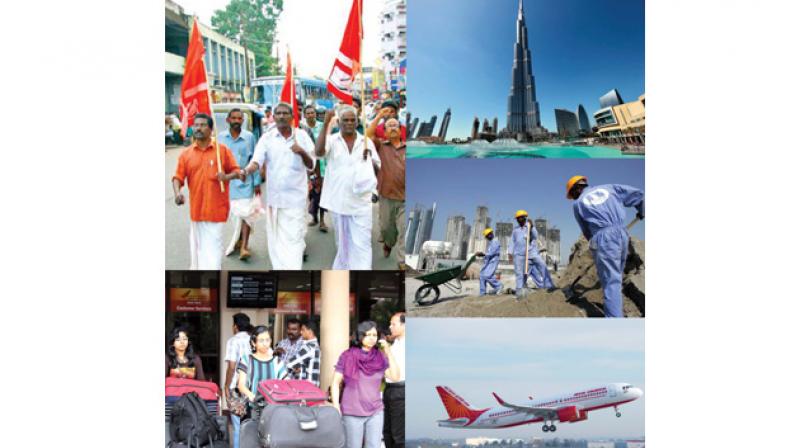Januses in jingoistic world

The political anomie of the figure of a Janus-faced Malayali, militant at home and passive outside Kerala, has stuck deep in contemporary cultural imaginations. While vignettes of remembrances from the first waves of Malayali migration to Ceylon (Sri Lanka), Burma (Myanmar) and Malaysia/Singapore in the early 20th century still appear randomly in contemporary chronicles, it is the exodus to the Gulf Council Countries (GCC) from mid 1970s onwards that has merited beingthe most excessively eulogized, romanticized and trivialized narration of Malayali migrationin literature, films and every other cultural and social discourse. The labor migration and settlers’ journeys from Kerala in the many pasts, have produced social and political leaders in regions where they had migrated to. A typical example is Singapore where a sizable slice of the trade union leadership has been held by Malayalis. Devan Nair who later became president of Singapore was a Malayali trade union leader there. Even now, a good number of persons of Malayali origins are part of the leadership of the People’s Action Party, the ruling party of Singapore.
Nevertheless, the putatively familiar image of Malayalis, militant at home and lacking combativeness in alien milieu in which they have migrated, both within and outside India, has come to stay. The politically radical Malayali who bows down and becomes disciplined in the GCC, the US immigrant Malayali smitten by the charms of the most advanced face of capitalism who laments about the progress that his/her homeland never achieves, the political double-standards of the European Malayali so on and so forth are characteristic examples of this perceived paradox. Malayalam films, including Islamic home video films (a genre popularized by sympathizers of political Islam in Kerala), that dealt with the diaspora experiences have sometimes projected the popular imageries of the paradox in myriad ways. Sometimes the films show local communist heroes who find hard to cope in the rigid apolitical, unorganized labor life in the GCC and sometimes it shows young GCC returned Malayali men struggling to find their ground back home.
But contemporary literature, both regional as well as the emerging pan-Indian immigrant writing from the second generation of GCC diaspora breaks these narrow and rigid caricatures and present the bleak political crises that bring around the unsung fortitudes and the fluid everyday existence of migrant laborers in the Middle East. Deepak Unnikrishnan, in his significant work of fiction set in UAE that is published recently, pertinently calls the immigrant population in the Middle-East as ‘the temporary people’. Malayalis, just as other nationals, are part of a swarming army of subjugated labor, who have no prospects of obtaining citizenship rights or workers’ rights and are helpless victims of an imposingsponsorship arrangement called Kafala, which makes their lives no better than that of bonded laborers of a foreign sponsor. The Malayali organizations in the Middle East and Kerala politicians who use them to fill their party coffers, remain largely indifferent to their plight. I have personally visited some of the ‘labor camps’in UAE, where 10 to 15 workers who work for 16-18 hours every day, dwelling in chocked single rooms.
On the other hand, back home, Kerala is proud of a tradition of radical social transformation marked by the emergence of reform movements in second half of the 19th century and first half of the 20th century. A section of the subaltern communities in Kerala responded rapidly to the new opportunities of limited economic mobility opened up by colonial globalization and began to slowly improve their economic prospects. This was followed by an attempt by the leaders of these communities to carve out a political space to articulate their need for social mobility and liberation from the caste structure, which was, in a sense, more regimented than its pan-Indian counterpart.Mass labor migrations during the period from Kerala, as part of the global circulation of plantation labor also helped reinforce some of these political aspirations through global flows of ideas, thoughts and resources.
The atomized modern migrant from Kerala, brokered through formalized global labor conduits and the class/caste-conscious worker rooted in Kerala living a collective memory of this emancipatory politics, belong to two totally different worlds of spatial imaginations. No significant attempt has been made to relate the migrants’ challenges to that of the inter-state migrant labor population in India, or to the intimidating global contexts that have become rigidly nationalistic and parochial and increasingly impervious to any alternative and fluid form of citizenship possibilities. If the discourses about their nostalgia and apolitical existence of the first generation of ‘Gulf Malayali’ failed to understand the larger realm of politics that the immigrants stepped into, the contemporary milieu of jingoistic nationalism across the globe, refuses completely to even bring them into any further visibility.
(The author is Professor at the School of Interdisciplinary Studies, English and Foreign Languages University, Hyderabad)

